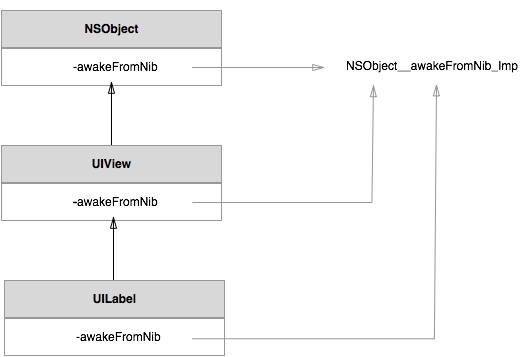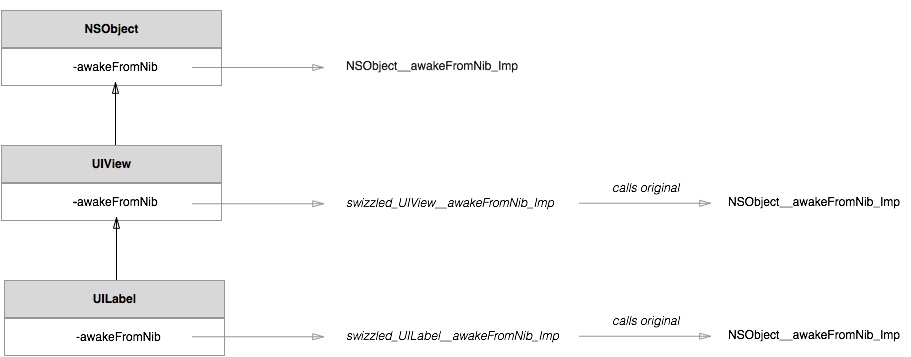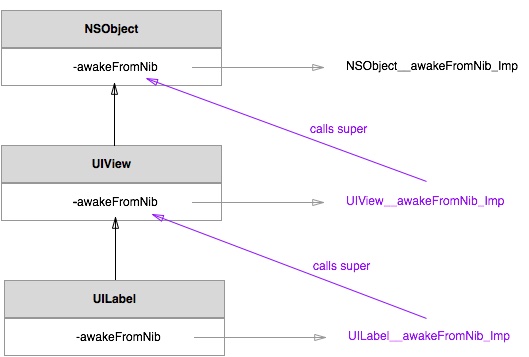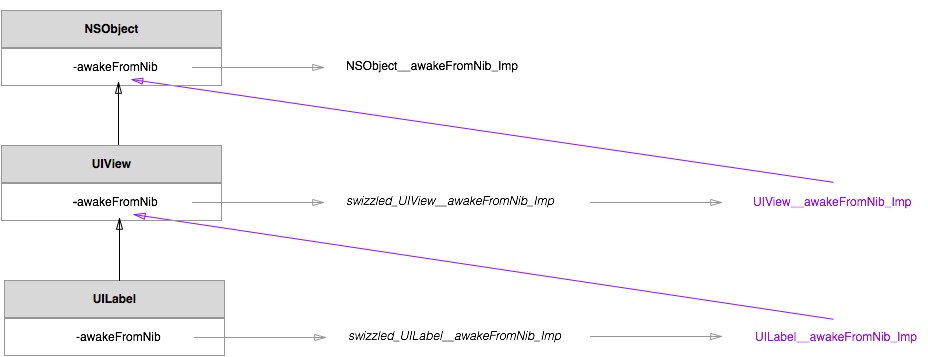Yet another article about method swizzling
4 December 2014Many Objective-C developers disregard method swizzling, considering it a bad practice. I don’t like method swizzling, I love it. Of course it is risky and can hurt you like a bullet. Carefully done, though, it makes it possible to fill annoying gaps in system frameworks which would be impossible to fill otherwise. From simply providing a convenient way to track the parent popover controller of a view controller to implementing Cocoa-like bindings on iOS, method swizzling has always been an invaluable tool to me.
- Function prototype
- Issues in class hierarchies
- First implementation attempt
- Large struct return values
- Wrapping up: IMP-swizzling
- Block-swizzling
- Macros
- Conclusion
Implementing swizzling correctly is not easy, though, probably because it looks straightforward at first (all is needed is a few Objective-C runtime function calls, after all). Though the Web is crawling with articles about the right way to swizzle a method, I sadly found issues with all of them.
The implementation discussed in this article may have issues of its own, but I do hope sharing it will help improve existing implementations, as well as mine. For this reason, do not regard these few words as a Done right article, only as a small step towards hopefully better swizzling implementations. There is a correct way to swizzle methods, but it probably still remains to be found.
Function prototype
Since the Objective-C runtime is a series of functions, I decided to implement swizzling as a function as well. Most existing implementations, for example the well-respected JRSwizzle, exchange IMPs associated with two selectors. Ultimately, though, method swizzling is about changing, not exchanging, which is why I prefer a function expecting an original SEL and an IMP arguments:
IMP class_swizzleSelector(Class clazz, SEL selector, IMP newImplementation);
instead of two SEL arguments:
IMP class_swizzleSelectorWithSelector(Class clazz, SEL selector, SEL swizzlingSelector);
Moreover, using an IMP (in other words a C-function) instead of a selector implementation avoids potential clashes if your swizzling selector name convention happens to be the same as the one used elsewhere, especially when dealing with 3rd party code. Don’t be too optimistic, accidental method overriding due to bad conventions can happen all the time.
The function above returns the original implementation, which must be properly cast and called from within the swizzling method implementation, so that the original behavior is preserved. If the method to swizzle is not implemented, I decided the function must do nothing and return NULL.
Issues in class hierarchies
When swizzling methods in class hierarchies, we must take extra care when the method we swizzle is not implemented by the class on which it is swizzled, but is implemented by one of its parents. For example, the -awakeFromNib method, declared and implemented at the NSObject level, is neither implemented by the UIView nor by the UILabel subclasses. When calling this method on an instance of any of theses classes, it is therefore the NSObject implementation which gets called:

If we naively swizzle the -awakeFromNib method both at the UIView and UILabel levels, we get the following result:

As we see, when -[UILabel awakeFromNib] is now called, the swizzled UIView implementation does not get called, which is not what is expected from proper swizzling.
The situation would be completely different if the -awakeFromNib method was implemented on UIView and UILabel. If this was the case, and if each implementation properly called the super method counterpart first, we would namely obtain:

and, after swizzling:

No swizzling implementation I encountered correctly deals with this issue, not even JRSwizzle. As should be clear from the last picture above, the solution to this problem is to ensure a method is always implemented by a class before swizzling it. If this is not the case, an implementation must be injected first, simply calling the super method counterpart. This way, all implementations will correctly be called after swizzling.
First implementation attempt
Based on the above, I first implemented instance method swizzling as follows:
#import <objc/runtime.h>
#import <objc/message.h>
IMP class_swizzleSelector(Class clazz, SEL selector, IMP newImplementation)
{
// If the method does not exist for this class, do nothing
Method method = class_getInstanceMethod(clazz, selector);
if (! method) {
return NULL;
}
// Make sure the class implements the method. If this is not the case, inject an implementation, calling 'super'
const char *types = method_getTypeEncoding(method);
class_addMethod(clazz, selector, imp_implementationWithBlock(^(__unsafe_unretained id self, va_list argp) {
struct objc_super super = {
.receiver = self,
.super_class = class_getSuperclass(clazz)
};
id (*objc_msgSendSuper_typed)(struct objc_super *, SEL, va_list) = (void *)&objc_msgSendSuper;
return objc_msgSendSuper_typed(&super, selector, argp);
}), types);
// Can now safely swizzle
return class_replaceMethod(clazz, selector, newImplementation, types);
}
For class method swizzling, it suffices to call the above function on a metaclass:
IMP class_swizzleClassSelector(Class clazz, SEL selector, IMP newImplementation)
{
return class_swizzleSelector(object_getClass(clazz), selector, newImplementation);
}
The imp_implementationWithBlock function is used as a trampoline to accomodate any kind of method prototype through a variable argument list va_list. The super method call is made by properly casting objc_msgSendSuper, available from <objc/message.h>. In order to prevent ARC from inserting incorrect memory management calls, the self parameter of the implementation block has been marked with __unsafe_unretained.
Large struct return values
As pointed out by Peter Steinberger and @__block on Twitter, struct returns require special care on some architectures.
Most method calls are funnelled through the objc_msgSend function, returning the result in a register. For large structs which cannot fit in a register, though, the compiler might generate a call to the special objc_msgSend_stret function, which returns the parameter on the stack instead. According to the ABI, this happens on 32-bit architectures for types whose size is neither 1, 2, 4 nor 8. The implementation above does not account for this special case and must therefore be changed to account for such cases.
For method returning large structs, we need the imp_implementationWithBlock function to generate the correct implementation by having the block return a large struct. The kind of struct and its layout are irrelevant, we only need it to be sufficiently large so that the compiler can make the right decision. As for objc_msgSend_stret, there is an objc_msgSendSuper_stret for super calls to methods returning large structs, which we need to use instead.
For large struct returns, instead of calling the class_swizzleSelector function above, we therefore must call the following class_swizzleSelector_stret function:
#import <objc/runtime.h>
#import <objc/message.h>
IMP class_swizzleSelector_stret(Class clazz, SEL selector, IMP newImplementation)
{
// If the method does not exist for this class, do nothing
Method method = class_getInstanceMethod(clazz, selector);
if (! method) {
return NULL;
}
// Make sure the class implements the method. If this is not the case, inject an implementation, only calling 'super'
const char *types = method_getTypeEncoding(method);
class_addMethod(clazz, selector, imp_implementationWithBlock(^(__unsafe_unretained id self, va_list argp) {
struct objc_super super = {
.receiver = self,
.super_class = class_getSuperclass(clazz)
};
// Sufficiently large struct
typedef struct LargeStruct_ {
char dummy[16];
} LargeStruct;
// Cast the call to objc_msgSendSuper_stret appropriately
LargeStruct (*objc_msgSendSuper_stret_typed)(struct objc_super *, SEL, va_list) = (void *)&objc_msgSendSuper_stret;
return objc_msgSendSuper_stret_typed(&super, selector, argp);
}), types);
// Can now safely swizzle
return class_replaceMethod(clazz, selector, newImplementation, types);
}
Wrapping up: IMP-swizzling
Having a separate class_swizzleSelector_stret function which must appropriately be called when large structs are returned is rather inconvenient. Fortunately, its implementation can be merged into class_swizzleSelector by checking return type size information for 32-bit architectures first. We obtain a single function for method swizzling with an IMP:
#import <objc/runtime.h>
#import <objc/message.h>
IMP class_swizzleSelector(Class clazz, SEL selector, IMP newImplementation)
{
// If the method does not exist for this class, do nothing
Method method = class_getInstanceMethod(clazz, selector);
if (! method) {
// Cannot swizzle methods which are not implemented by the class or one of its parents
return NULL;
}
// Make sure the class implements the method. If this is not the case, inject an implementation, only calling 'super'
const char *types = method_getTypeEncoding(method);
#if !defined(__arm64__)
NSUInteger returnSize = 0;
NSGetSizeAndAlignment(types, &returnSize, NULL);
// Large structs on 32-bit architectures
if (sizeof(void *) == 4 && types[0] == _C_STRUCT_B && returnSize != 1 && returnSize != 2 && returnSize != 4 && returnSize != 8) {
class_addMethod(clazz, selector, imp_implementationWithBlock(^(__unsafe_unretained id self, va_list argp) {
struct objc_super super = {
.receiver = self,
.super_class = class_getSuperclass(clazz)
};
// Sufficiently large struct
typedef struct LargeStruct_ {
char dummy[16];
} LargeStruct;
// Cast the call to objc_msgSendSuper_stret appropriately
LargeStruct (*objc_msgSendSuper_stret_typed)(struct objc_super *, SEL, va_list) = (void *)&objc_msgSendSuper_stret;
return objc_msgSendSuper_stret_typed(&super, selector, argp);
}), types);
}
// All other cases
else {
#endif
class_addMethod(clazz, selector, imp_implementationWithBlock(^(__unsafe_unretained id self, va_list argp) {
struct objc_super super = {
.receiver = self,
.super_class = class_getSuperclass(clazz)
};
// Cast the call to objc_msgSendSuper appropriately
id (*objc_msgSendSuper_typed)(struct objc_super *, SEL, va_list) = (void *)&objc_msgSendSuper;
return objc_msgSendSuper_typed(&super, selector, argp);
}), types);
#if !defined(__arm64__)
}
#endif
// Swizzling
return class_replaceMethod(clazz, selector, newImplementation, types);
}
The _stret variants are not available on ARM 64, thus the extra preprocessor adornments.
Example of use
To swizzle a method, define a static C-function for the new implementation and call class_swizzleSelector or class_swizzleClassSelector to set it as new one. Save the original implementation into a function pointer matching the function signature, and make sure the new implementation calls it somehow:
static id (*initWithFrame)(id, SEL, CGRect) = NULL;
static void (*awakeFromNib)(id, SEL) = NULL;
static void (*dealloc)(__unsafe_unretained id, SEL) = NULL;
static id swizzle_initWithFrame(UILabel *self, SEL _cmd, CGRect frame)
{
if ((self = initWithFrame(self, _cmd, frame))) {
// ...
}
return self;
}
static void swizzle_awakeFromNib(UILabel *self, SEL _cmd)
{
awakeFromNib(self, _cmd);
// ...
}
static void swizzle_dealloc(__unsafe_unretained UILabel *self, SEL _cmd)
{
// ...
dealloc(self, _cmd);
}
@implementation UILabel (SwizzlingExamples)
+ (void)load
{
initWithFrame = (__typeof(initWithFrame))class_swizzleSelector(self, @selector(initWithFrame:), (IMP)swizzle_initWithFrame);
awakeFromNib = (__typeof(awakeFromNib))class_swizzleSelector(self, @selector(awakeFromNib), (IMP)swizzle_awakeFromNib);
dealloc = (__typeof(dealloc))class_swizzleSelector(self, sel_getUid("dealloc"), (IMP)swizzle_dealloc);
}
@end
Note that I added an extra __unsafe_unretained specifier to the swizzle_dealloc prototype to ensure ARC does not insert additional memory management calls. I also cheated by getting the dealloc selector with sel_getUid, since @selector(dealloc) cannot be used with ARC.
Block-swizzling
Thanks to imp_implementationWithBlock, we can provide a block instead of an IMP for the new implementation:
IMP class_swizzleSelectorWithBlock(Class clazz, SEL selector, id newImplementationBlock)
{
IMP newImplementation = imp_implementationWithBlock(newImplementationBlock);
return class_swizzleSelector(clazz, selector, newImplementation);
}
IMP class_swizzleClassSelectorWithBlock(Class clazz, SEL selector, id newImplementationBlock)
{
IMP newImplementation = imp_implementationWithBlock(newImplementationBlock);
return class_swizzleClassSelector(clazz, selector, newImplementation);
}
The block signature itself does not include the selector parameter, as specified in the imp_implementationWithBlock documentation.
Example of use
The above example can be rewritten using blocks, eliminating the need for static methods and function pointers:
@implementation UILabel (SwizzlingExamples)
+ (void)load
{
__block IMP originalInitWithFrame = class_swizzleSelectorWithBlock(self, @selector(initWithFrame:), ^(UILabel *self, CGRect frame) {
if ((self = ((id (*)(id, SEL, CGRect))originalInitWithFrame)(self, @selector(initWithFrame:), frame))) {
// ...
}
return self;
});
__block IMP originalAwakeFromNib = class_swizzleSelectorWithBlock(self, @selector(awakeFromNib), ^(UILabel *self) {
((void (*)(id, SEL))originalAwakeFromNib)(self, @selector(awakeFromNib));
// ...
});
__block IMP originalDealloc = class_swizzleSelectorWithBlock(self, sel_getUid("dealloc"), ^(__unsafe_unretained UILabel *self) {
// ...
((void (*)(id, SEL))originalDealloc)(self, sel_getUid("dealloc"));
});
}
@end
Returned original implementations must be saved into __block variables to be accessible from within the corresponding implementation blocks.
Macros
Some redundancy is found in both examples of use above, but can be eliminated by defining a few convenience macros:
#define SwizzleSelector(clazz, selector, newImplementation, pPreviousImplementation) \
(*pPreviousImplementation) = (__typeof((*pPreviousImplementation)))class_swizzleSelector((clazz), (selector), (IMP)(newImplementation))
#define SwizzleClassSelector(clazz, selector, newImplementation, pPreviousImplementation) \
(*pPreviousImplementation) = (__typeof((*pPreviousImplementation)))class_swizzleClassSelector((clazz), (selector), (IMP)(newImplementation))
#define SwizzleSelectorWithBlock_Begin(clazz, selector) { \
SEL _cmd = selector; \
__block IMP _imp = class_swizzleSelectorWithBlock((clazz), (selector),
#define SwizzleSelectorWithBlock_End );}
#define SwizzleClassSelectorWithBlock_Begin(clazz, selector) { \
SEL _cmd = selector; \
__block IMP _imp = class_swizzleClassSelectorWithBlock((clazz), (selector),
#define SwizzleClassSelectorWithBlock_End );}
To emphasize that the IMP-swizzling macros set the new implementation variable, the corresponding macro parameter needs to be adorned with an ampersand.
Block-swizzling, on the other hand, has been turned into a pair of macros. This avoids block parameters, which do not work well with macros:
- Macro expansion of a block turns the block implementation into a single line, confusing the debugger
- A block can contain commas, preventing correct macro argument detection (this can be avoided by enclosing the blocks within parentheses, though)
Moreover, the block-swizzling macros declare a hidden scope where the selector _cmd and original implementation _imp are immediately available.
Example of use
The two previous examples can now be rewritten as follows:
@implementation UILabel (SwizzlingExamples)
// Function pointers and static functions, as defined above
+ (void)load
{
SwizzleSelector(self, @selector(initWithFrame:), swizzle_initWithFrame, &initWithFrame);
SwizzleSelector(self, @selector(awakeFromNib), &swizzle_awakeFromNib, &awakeFromNib);
SwizzleSelector(self, sel_getUid("dealloc"), &swizzle_dealloc, &dealloc);
}
@end
respectively:
@implementation UILabel (SwizzlingExamples)
+ (void)load
{
SwizzleSelectorWithBlock_Begin(self, @selector(initWithFrame:))
^(UILabel *self, CGRect frame) {
if ((self = ((id (*)(id, SEL, CGRect))_imp)(self, _cmd, frame))) {
// ...
}
return self;
}
SwizzleSelectorWithBlock_End;
SwizzleSelectorWithBlock_Begin(self, @selector(awakeFromNib))
^(UILabel *self) {
((void (*)(id, SEL))_imp)(self, _cmd);
// ...
}
SwizzleSelectorWithBlock_End;
SwizzleSelectorWithBlock_Begin(self, sel_getUid("dealloc"))
^(__unsafe_unretained UILabel *self) {
// ...
((void (*)(id, SEL))_imp)(self, _cmd);
}
SwizzleSelectorWithBlock_End;
}
@end
I especially like the compactness of block-swizzling using macros. There is no need to define separate functions and method pointers, and the swizzled method implementation can be easily recognized, enclosed between the Begin and End macros.
Conclusion
The implementation discussed in this article might not be optimal, but should cover most practical cases. It is available from my CoconutKit framework, with a comprehensive test suite, or from the following gist. Have fun with method swizzling!